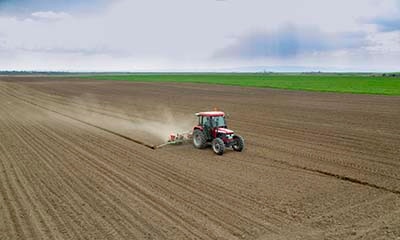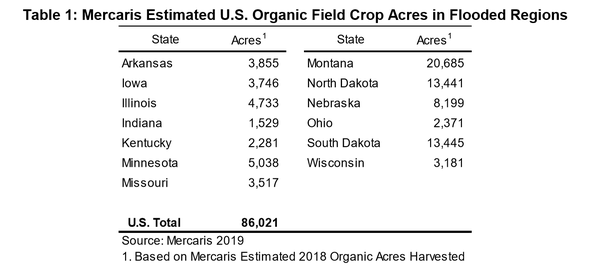Majority of organic farmers indicate they will be adjusting their corn and soybean planting decisions.
July 9, 2019

Less than 3% of U.S. organic field crop acres were located in areas affected by this spring's most significant flooding, Mercaris said in its newly released “Spring Planting Special Report.” The report focuses specifically on organic agriculture and details how organic field crop acreage has been affected by unprecedented cold and wet springtime weather this year, limiting farm management options.
Using a combination of precision mapping, farmer surveys and interviews, Mercaris created a comprehensive picture detailing the impacts of flooding and precipitation on planted organic acreage, particularly in the Midwest. Additionally, the report analyzed how organic growers are using tools like crop insurance and alternative cropping techniques in order to cope with losses this season.
Mercaris mapped the concentration of certified organic field crop farms per ZIP code, along with flood stage data acquired from the U.S. Geological Survey (USGS). While organic farmers were found to have fewer direct effects of flooding, Mercaris found that organic growers were still affected by above-average precipitation.

To enhance the data presented in this special report, Mercaris conducted a survey of farmers and found that a significant percentage of organic farmers will be filing a prevented planting insurance claim this year. The majority of farmers surveyed also indicated that they will be adjusting their corn and soybean planting decisions; however, an overwhelming majority still plan to plant at least some acres with a fall-harvested cash crop.
Overall, Mercaris said certified acres do appear to have been reduced by the spring weather but added that a shift toward organic cover crops will help limit the overall reduction in planted organic acres. With fewer planted acres as well as a likely reduction in yields, the organic supply chain will be affected through the next year, the company said.
“This year’s unprecedented cold, wet weather shows the need for analysis that specifically focuses on organic agriculture,” Mercaris founder and chief executive officer Kellee James said. “Organic agriculture is dynamic and growing but still a smaller-volume supply chain. As such, disruptions can have an outsized impact.”
You May Also Like


.png?width=300&auto=webp&quality=80&disable=upscale)
